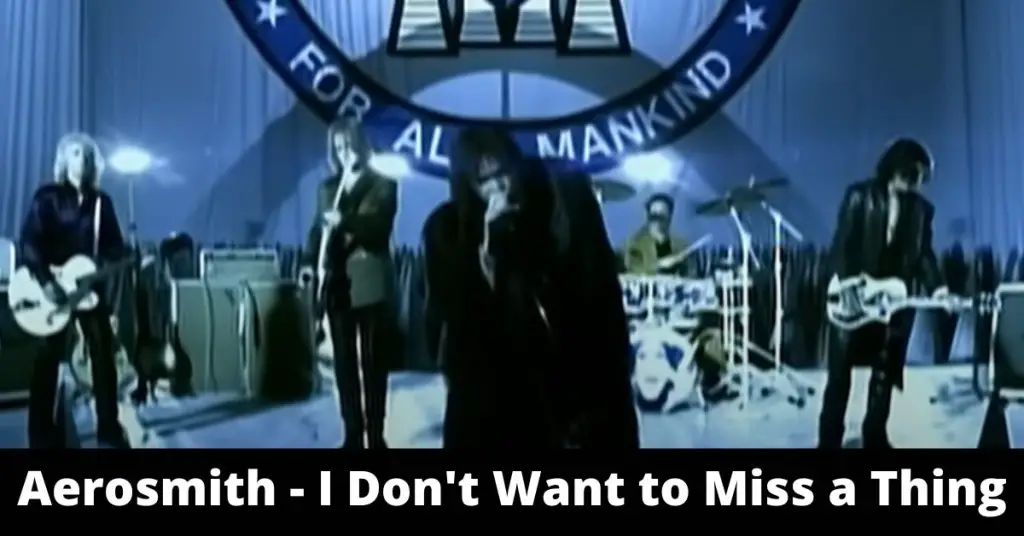For a band that built its reputation on gritty, blues-infused rock ’n’ roll, Aerosmith surprised the world in 1998 with a sweeping, emotional power ballad that would become the biggest hit of their career. That song was “I Don’t Want to Miss a Thing,” and it didn’t just top the charts—it etched itself into pop culture, love playlists, and wedding soundtracks for decades to come.
Written by Diane Warren, performed with heart-stopping intensity by Steven Tyler, and boosted by a blockbuster Hollywood film, “I Don’t Want to Miss a Thing” became an unexpected yet undeniable moment of rock ballad brilliance.
The Soundtrack to the End of the World
The song was written for the 1998 science fiction disaster film Armageddon, which starred Bruce Willis and featured Tyler’s own daughter, Liv Tyler, in a lead role. Producers wanted a powerful theme song that could match the film’s grand scale and emotional stakes, and legendary songwriter Diane Warren delivered just that.
Originally, the song wasn’t even written with Aerosmith in mind. But once producer Jerry Bruckheimer brought the demo to the band, it was clear: only Steven Tyler’s voice—full of grit, range, and operatic passion—could do it justice.
The result? A flawlessly crafted, emotionally charged power ballad that soared just like the film’s doomed space shuttle.
“I could stay awake just to hear you breathing / Watch you smile while you are sleeping…”
A New Chapter for Aerosmith
By the time “I Don’t Want to Miss a Thing” was released, Aerosmith had already experienced decades of highs and lows—from their explosive success in the ’70s to a rough patch in the ’80s, followed by a roaring comeback in the early ’90s with albums like Pump and Get a Grip. But this song represented something different.
It wasn’t the swaggering, sleazy Aerosmith of “Walk This Way” or “Love in an Elevator.” This was a band stepping into the realm of orchestral emotion, embracing vulnerability, and aiming for cinematic grandeur. With strings swelling, drums pounding, and Tyler belting out each line like a man possessed, the song showed a softer, more romantic side of Aerosmith—without losing their edge.
Chart-Topping History
“I Don’t Want to Miss a Thing” was released on August 18, 1998, and debuted at No. 1 on the Billboard Hot 100—a first for the band. Despite their legendary status and years of radio hits, Aerosmith had never topped the U.S. singles chart before.
The song also dominated global charts, hitting No. 1 in multiple countries and staying in heavy radio rotation for months. It was nominated for an Academy Award and a Grammy, and it introduced Aerosmith to a younger generation who might have known the name but had never experienced the band at full emotional throttle.
Steven Tyler’s Vocal Tour de Force
What truly elevates the song is Steven Tyler’s performance. His voice walks the tightrope between delicate and explosive—whispering in the verses, screaming with abandon in the final choruses. There’s drama in every breath, every vibrato, every soaring high note.

This wasn’t just a song—it was a performance, a declaration of love and desperation so over-the-top that it became irresistible. Whether you were into rock, pop, or simply in love, “I Don’t Want to Miss a Thing” hit the mark.
A Cultural Touchstone
Over the years, the song has become a mainstay at weddings, proms, and emotional movie montages. It’s been covered by artists across genres, featured in TV shows and parodies, and played at countless life-defining moments.
Critics were initially split—some praised its grandiosity, others called it cheesy. But the fans knew better. “I Don’t Want to Miss a Thing” has endured not just because of its chart success, but because it tapped into something universal: the fear of loss, the power of love, and the longing to hold onto a perfect moment just a little longer.
Final Thoughts
“I Don’t Want to Miss a Thing” may not have started as a typical Aerosmith song, but it became one of their most powerful legacies. It showed the world that even the roughest rockers could bleed emotion and belt out ballads worthy of the silver screen.
In the end, it’s not just a love song—it’s a reminder that some moments are too beautiful, too fleeting, too precious to let pass by.
So hold on.
And don’t miss a thing.


Facebook Comments